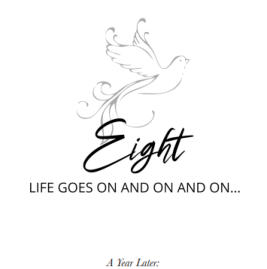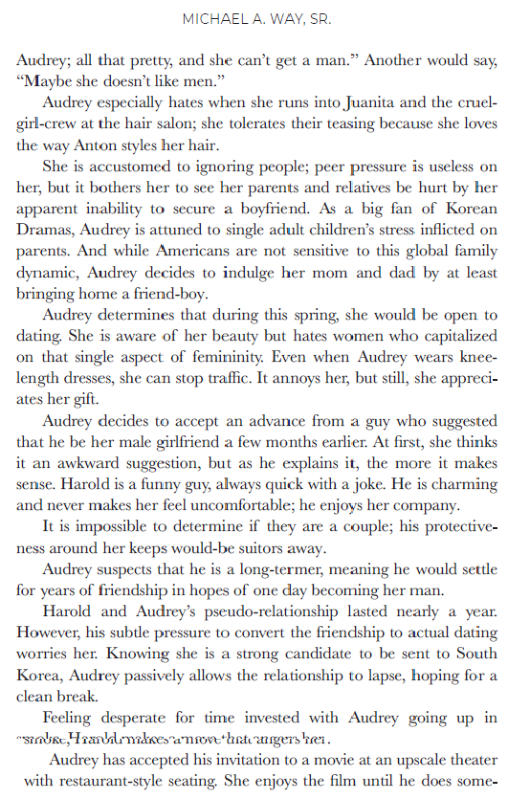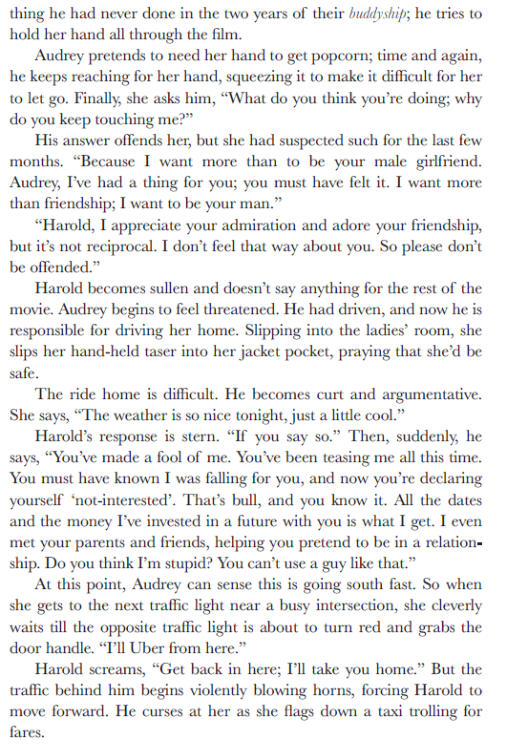A Year Later:
(Abridged)
Time moves on, and Jonathan and Audrey forget about their
chance of almost meeting summer after summer. Yet, now
and then, something reminds each of the momentary encounters they
could never define.
Both have now completely forgotten about the encounter and end
up at a corporate rah-rah session hosted by their respective employers,
one a Federal employee, the other a Federal contractor with a major
government agency.
Audrey is the first to take the dive into the relationship world.
Several years have passed, and she has been a bridesmaid to college
friends each May, June, and July for the last two summers.
Fate is cruel, since she is often the prettiest woman and catches the
bride’s bouquet-toss six out of seven times. Many attendees know each
other from their associations. On occasion, the ‘mean-girl syndrome’
manifests itself as she hears the gossip collectively. “What’s wrong with
Audrey; all that pretty, and she can’t get a man.” Another would say,
“Maybe she doesn’t like men.”
Audrey especially hates when she runs into Juanita and the cruel-girl-crew at
the hair salon; she tolerates their teasing because she loves the way Anton
styles her hair.
She is accustomed to ignoring people; peer pressure is useless on
her, but it bothers her to see her parents and relatives be hurt by her
apparent inability to secure a boyfriend. As a big fan of Korean
Dramas, Audrey is attuned to single adult children’s stress inflicted on
parents. And while Americans are not sensitive to this global family
dynamic, Audrey decides to indulge her mom and dad by at least
bringing home a friend-boy.
Audrey determines that during this spring, she would be open to
dating. She is aware of her beauty but hates women who capitalized
on that single aspect of femininity. Even when Audrey wears knee-length
dresses, she can stop traffic. It annoys her, but still, she appreci‐
ates her gift.
Audrey decides to accept an advance from a guy who suggested
that he be her male girlfriend a few months earlier. At first, she thinks
it an awkward suggestion, but as he explains it, the more it makes
sense. Harold is a funny guy, always quick with a joke. He is charming
and never makes her feel uncomfortable; he enjoys her company.
It is impossible to determine if they are a couple; his protective‐
ness around her keeps would-be suitors away.
Audrey suspects that he is a long-termer, meaning he would settle
for years of friendship in hopes of one day becoming her man.
Harold and Audrey’s pseudo-relationship lasted nearly a year.
However, his subtle pressure to convert the friendship to actual dating
worries her. Knowing she is a strong candidate to be sent to South
Korea, Audrey passively allows the relationship to lapse, hoping for a
clean break.
Feeling desperate for time invested with Audrey going up in
smoke, Harold makes a move that angers her.
Audrey has accepted his invitation to a movie at an upscale theater
with restaurant-style seating. She enjoys the film until he does something
he had never done in the two years of their buddyship; he tries to
hold her hand all through the film.
Audrey pretends to need her hand to get popcorn; time and again,
he keeps reaching for her hand, squeezing it to make it difficult for her
to let go. Finally, she asks him, “What do you think you’re doing; why
do you keep touching me?”
His answer offends her, but she had suspected such for the last few
months. “Because I want more than to be your male girlfriend.
Audrey, I’ve had a thing for you; you must have felt it. I want more
than friendship; I want to be your man.
”
“Harold, I appreciate your admiration and adore your friendship,
but it’s not reciprocal. I don’t feel that way about you. So please don’t
be offended.”
Harold becomes sullen and doesn’t say anything for the rest of the
movie. Audrey begins to feel threatened. He had driven, and now he is
responsible for driving her home. Slipping into the ladies’ room, she
slips her hand-held taser into her jacket pocket, praying that she’d be
safe.
The ride home is difficult. He becomes curt and argumentative.
She says, “The weather is so nice tonight, just a little cool.”
Harold’s response is stern. “If you say so.” Then, suddenly, he
says, “You’ve made a fool of me. You’ve been teasing me all this time.
You must have known I was falling for you, and now you’re declaring
yourself ‘not-interested’. That’s bull, and you know it. All the dates
and the money I’ve invested in a future with you is what I get. I even
met your parents and friends, helping you pretend to be in a relation‐
ship. Do you think I’m stupid? You can’t use a guy like that.”
At this point, Audrey can sense this is going south fast. So when
she gets to the next traffic light near a busy intersection, she cleverly
waits till the opposite traffic light is about to turn red and grabs the
door handle. “I’ll Uber from here.”
Harold screams, “Get back in here; I’ll take you home.” But the
traffic behind him begins violently blowing horns, forcing Harold to
move forward. He curses at her as she flags down a taxi trolling for
fares.
Sitting back in the car, she asks the driver, “Can we just sit for a
minute; I need to catch my breath.”
The driver says, “I saw that back there. I was behind you for a few
blocks, and your body language made me think you might be in trou‐
ble. Let me know where you want to go, and I’ll take you at no charge.
I have a daughter your age, and I hope someone will help her if she
ever needs it. You’re safe now, ma’am; pay it forward one of these
days.”
As promised, he plays relaxing music on the entertainment system
and is quiet to her front door. He hands her a card and says, “If you
ever need a ride, feel free to call. Have a blessed rest of your
evening.”
He drives off. Audrey reaches her home safely, opens her cell
phone, and blocks Harold’s number forever.
Still shaking from the event, she carefully looks out to all the
windows of her home, ensuring that Harold is not stalking her. She is
fortunate to have a townhouse with an attached garage. Exiting the
garage, Audrey drives to work, still shaking and a bit nervous. She
tries to talk herself out of the feeling that last night was the prelude to
a physical attack of much worse.
The idea of having a man-friend for the sake of appearances was
just too much.
Then, suddenly, after a two-year respite, she wonders for the first
time in forever about her mystery man at the little grocery store in
Cape St. Clair.
Stopping by her parent’s home that evening, she mentions to
them, “I’m flying out to Korea the next day after the cyber conference
at the Dulles Expo Center. Scored an assignment from my boss to
help PGP.”
“Her mom asks, “Do you have time to have dinner with us? It will
be ready in twenty minutes.”
Audrey follows her dad to the back deck; he can sense she wants to
talk.
“Daddy, that guy I bought home, Harold, became violent with me
when I turned down his romantic conversion. He said he didn’t want
to be friends anymore. I was actually scared and thought I’d have to
use the taser you gave me in college. I’ve never seen him like that; I
trusted him. I felt he would’ve forced himself on me if the conditions
were right. That’s one of the reasons I accepted the Seoul assignment.
Am I right to be angry; you’re a man; tell me?”
Audrey’s father answers solemnly. “Separating myself from being
your father, I’d like to kick his you-know-what. No man has a right to
impose his desire on any woman. I understand libido, and even my
contemporaries told me to get a gun when you were a teenager. Why?
They said, ‘Your daughter is so pretty, you will have to fight the suitors off.’ I
laughed then, but as you got older, even I, your dad, could understand
that you inherited what made me crazy about your mom. Still, it
would be best if you didn’t have to deal with that. My advice: never
see him again; don’t take his calls, apologies, or anything. Why?
Because if he would work on you as a friend for nearly two years, he’s
a long-con vs. a short-con. He’s the type that will make you his goal,
and if you let him in the door, he will consider you the one that got
away. He will suck you back into his web, and when he thinks your
guard is down, he will either gently court you or rape you. So, please
don’t do it. And if I ever see him again, I will tell him a thing or two; I
promise he will never bother you again.”
Dinner with her mom and dad is great and comforting. Audrey
kisses her parents, and they wish her a safe and fun trip with loving
parental hugs. Audrey tells them, “I love you guys. Sometimes when
you’re grown, one doesn’t think they need their mothers and fathers;
you guys are the best. Goodnight.”






READ A SAMPLE OF CHAPTER 8

FINDING THE RIGHT PERSON IS
NOT EASY FOR MEN OR WOMEN
SOME MEN WILL DO ANYTHING… Read the sample posted here. Chapter 8 is titled, Life Goes on and on. Here, Audrey, the heroine of the story, is fed up with the insanity of the dating games forced on women with one goal in mind. Guys have so many come-ons designed to sleep with her that she almost gives up. But, her parents want to see her happy and they also gently nudge her that grandchildren would be nice. So, to appease them, she dates a nice man who says he wants to be just a friend. His name is Harold. After being a freind for a while, Harold turns up the heat on Audrey in a very unexpected way that both scares and angers her. This portion of Chapter 8 is tense as it demonstrates the predatory maneuvers some men use in order to score. Yikes! This is awful, but it happens all the time. Enjoy! Go buy the book; you’ll love it.

READ A
SAMPLE OF
CHAPTER 8
FINDING THE RIGHT PERSON IS
NOT EASY FOR MEN OR WOMEN
SOME MEN WILL DO ANYTHING… Read the sample posted here. Chapter 8 is titled, Life Goes on and on. Here, Audrey, the heroine of the story, is fed up with the insanity of the dating games forced on women with one goal in mind. Guys have so many come-ons designed to sleep with her that she almost gives up. But, her parents want to see her happy and they also gently nudge her that grandchildren would be nice. So, to appease them, she dates a nice man who says he wants to be just a friend. His name is Harold. After being a freind for a while, Harold turns up the heat on Audrey in a very unexpected way that both scares and angers her. This portion of Chapter 8 is tense as it demonstrates the predatory maneuvers some men use in order to score. Yikes! This is awful, but it happens all the time. Enjoy! Go buy the book; you’ll love it.
























